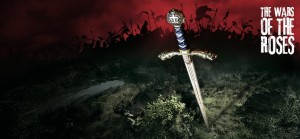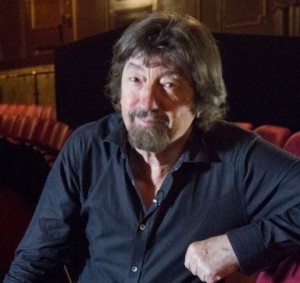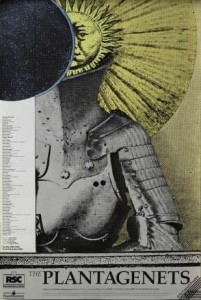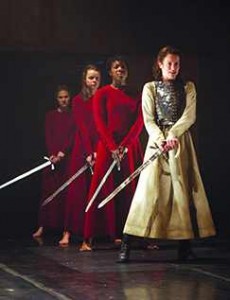In an interview published in February 2014 Trevor Nunn explained that it was his aim to direct all of Shakespeare’s plays “before I hang up my boots”, with only seven left to go. “I’m very keen to do a particular production of King John but what I’ve got to try and do is set up the War of the Roses sequence.” Since then he has ticked The Two Gentlemen of Verona off his list with a student production, and later this year will be working on Pericles with Theatre for a New Audience. And that Wars of the Roses sequence is on track for later on this year with a run at the Rose Theatre, Kingston-upon-Thames. Previews begin on 16 September and the productions will run until 31 October.
Casting is just being announced: Joely Richardson will play Queen Margaret, and others in the case include Rufus Hound (Bedford, Bolingbroke, Cade and Rivers), Robert Sheehan (Richard III), Kare Conradi(Edward IV), Oliver Cotton (Winchester, Clifford and Hastings), Laurence Spellman (Young Clifford and Richmond), Alex Waldmann (Henry VI and Tyrrell) and Susan Tracy (Margery Jourdain and Duchess of York). As well as over 20 professional actors, a local community chorus will complete the ensemble. It will be the largest company to perform at the Rose since it opened in 2008.
 The Wars of the Roses consists of a conflation of the three Henry VI plays into two parts, plus Richard III, so if one was to be pedantic it could be claimed that they are not “proper” Shakespeare plays, but there are other reasons why it is so appropriate for Nunn to revisit this trilogy. It will reunite Nunn with designer John Napier, with whom he worked on many of his most successful productions including Nicholas Nickleby. Their design will “transform the Rose’s auditorium”. It’s also a way of paying homage to those who created the original production. In a recent interview about this project he talked about what this particular production will mean to him: “doing a revival of that text, of that adaptation, is one way that I can celebrate the astonishing careers of Peter Hall and John Barton… I hugely admire both of them and their achievements and I was lucky enough to have them both as mentors.”
The Wars of the Roses consists of a conflation of the three Henry VI plays into two parts, plus Richard III, so if one was to be pedantic it could be claimed that they are not “proper” Shakespeare plays, but there are other reasons why it is so appropriate for Nunn to revisit this trilogy. It will reunite Nunn with designer John Napier, with whom he worked on many of his most successful productions including Nicholas Nickleby. Their design will “transform the Rose’s auditorium”. It’s also a way of paying homage to those who created the original production. In a recent interview about this project he talked about what this particular production will mean to him: “doing a revival of that text, of that adaptation, is one way that I can celebrate the astonishing careers of Peter Hall and John Barton… I hugely admire both of them and their achievements and I was lucky enough to have them both as mentors.”
It’s also appropriate because of the connection between Peter Hall and the Rose Theatre in Kingston: “He was its founding father – it was his last artistic directorship before he retired. I remember visiting the venue with him when it was still a building site, and several times since then, so it’s a very emotional place for me. And it’s modelled on the original Rose on the south bank, which is where the Henry VI plays and Richard III were first performed. So they’re coming home. ”
The Wars of the Roses, first staged in 1963 and revived in 1964, was the first major success of the newly-formed Royal Shakespeare Company founded by Peter Hall, and began the RSC’s close association with these plays. In 1977 Terry Hands proved that it was possible to stage all three parts of Henry VI in a cycle starring the great Shakespearian actor Alan Howard, with his favourite designer Farrah. The English Shakespeare Company (founded by long-term RSC stalwarts Michael Pennington and Michael Bogdanov) produced The Wars of the Roses in the late 1980s, comprising all the history plays from Richard II to Richard III, with the Henry VI plays edited into two with the titles King Henry VI – House of Lancaster and House of York and Adrian Noble’s 1988 Plantagenets was also based on the Hall/Barton cycle.
Most recently for the RSC Michael Boyd directed all three Henry VI plays at the Swan Theatre in 2000, then revived them as part of the whole history cycle at the Courtyard Theatre in 2006-7, with Tom Piper who is now RSC Associate Designer. It’s notable how often directors and designers forge long-lasting collaborations during the creation of these challenging history cycles.
In his programme note to The Plantagenets, Alan Sinfield noted that each of these cycles took a slightly different view of history and the “innate destructiveness in human affairs”. In 1963 “Hall invoked the Tudor idea of order….[and] drew upon fashionable attempts to understand human behaviour by comparing it with that of animals, suggesting than man has an instinctive will to dominate”. In 1977 the programme notes suggested “that people are innately aggressive,…the implacable roller of history crushing everyone and everything. The idea…encourages us to put up with things the way they are otherwise it will all get out of hand again”. The Plantagenets had a much less political message, showing “a specific moment in the disintegration of feudal chivalry, as a precarious social arrangement succumbs to contradictions in its structure”. For Nunn, “The reason is that they remain urgent and relevant and capable of making us think ‘oh god, we’re still doing the same things, we’re still resorting to battle and bloodshed’. The plays really investigate that instinct of why we resort to war.”




